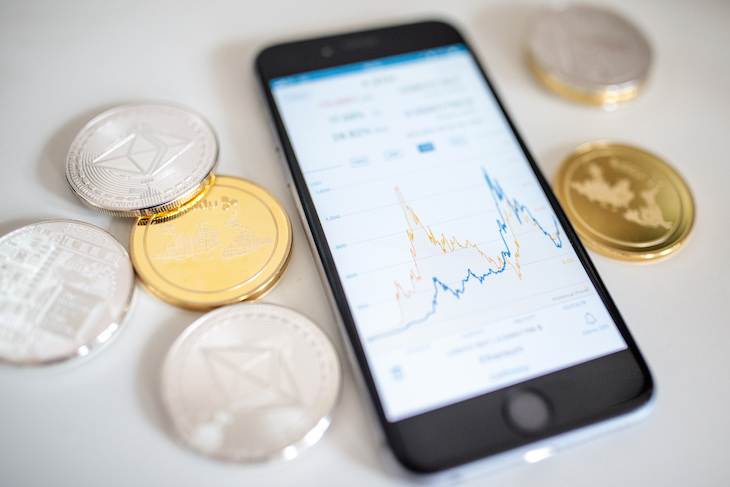Since its inception, cryptocurrency has been regarded as technically fascinating but fundamentally unreliable. Those who invested £10 in Bitcoin eight years ago would have £1.6 million today — a fluctuation which, while mind-boggling, further undermines the notion that digitally created currency is a stable store of value. At first, it was dismissed as a toy for geeks. Then it was seen as a threat, used by criminals to buy drugs and guns. Some, like Lloyds Bank, have refused to carry out any cryptocurrency transactions on behalf of customers. But its popularity has kept growing and this week, it made a significant leap towards the mainstream.
Rather than ban Bitcoin, the New York Stock Exchange has said it is developing a trading platform which would allow investors to buy and hold virtual currencies far more easily. This brings these currencies out of the shadows. It is becoming clear that the image of cryptocurrency as a haven for criminals and fraudsters has been greatly exaggerated. Bitcoin proved to be no hiding place for Ross Ulbricht, the creator of the illicit drugs market Silk Road, who was jailed for life in 2015.
The technology such currencies are based on, blockchain, has allowed other Bitcoin epigones to be set up. In theory, Bitcoin poses a threat to the current world order: if governments lose their monopoly over the ability to print money, what then? In her book The Mandibles, our columnist Lionel Shriver imagined an American economy destroyed by cryptocurrency supplanting the dollar as the world’s reserve currency. A wicked fantasy, but many central bankers talk as if they believe it might come true.
Mark Carney, Governor of the Bank of England, has been particularly excitable on the topic. He has said the volatility of cryptocurrency last year was 25 times that of equities — something he sees as such a problem that it justifies regulation. Yet the fact that a commodity, or currency manifesting as a commodity, is the subject of irrational speculation is not in itself a reason for governments to ban or control them. Governments did not ban railways during the years of ‘railway mania’ in the 1840s, or tulips during the tulip mania of the 1630s. Neither did they attempt to ban the internet on the grounds that the dotcom boom was doomed to lose many imprudent investors their shirts.
Central banks can’t seem to decide whether to suppress cryptocurrency or to join in. Carney talks of regulation, the former chair of the Federal Reserve, Janet Yellen, has floated the idea of an official cryptocurrency, the crypto dollar. Officials in the Bank of England have looked — and quickly discarded — the same idea.
Central banks like to think that they can control the supply and value of money, and see cryptocurrency as a threat to that. Why the rest of us should see these currencies as a concern is another matter. They could serve to protect individuals against over-zealous central bankers who are happy to use inflation as an economic tool. We are still in the middle of an unprecedented monetary experiment, quantitative easing, which for the past decade has had substantial distorting effects on the economy. Several central bankers, including Andy Haldane, the Bank of England’s chief economist, have suggested going much further: in a future recession, they have proposed the idea of using negative interest rates in order to stimulate the economy — effectively punishing savers by forcing them to spend their savings in order to take up the slack created by the over-borrowed.
Such thinking is based on the premise that the public’s money is really the government’s to play with. But if savers and investors choose instead to store their wealth in alternative currencies — be it the Swiss franc or a cryptocurrency — it should not be the business of governments to stop them. On the contrary, politicians should be asking whether cryptocurrency can add variety and stability to the global financial system. So far, this debate has been seen as the preserve of cranks and conspiracy theorists. But it is harder to dismiss now there is $200 billion of value stored in these virtual currencies.
In 1998, the Nobel laureate Paul Krugman declared that by 2005 it would ‘become clear that the internet’s impact on the economy has been no greater than the fax machine’s’. It wasn’t necessarily a stupid remark at the time. But new technology can disrupt and transform how the world works in ways that are hard to predict. Innovation can be seen as a joke, then an illegal threat, before being accepted — as we’ve seen with the online distribution of music and videos. This seems to be the general direction of travel for cryptocurrency.
So it would be wrong for either Theresa May or Mark Carney to disregard crypto-currency as the drug dealer’s friend. Governments are not going to want them to be used to evade taxes, and fraud should be treated as fraud in whichever currency it is conducted. But as cryptocurrency matures and grows out of the phase of irrational speculation, its uses will become clear. Better to find ways of working with these currencies than trying to banish them or pretend they do not exist.
Got something to add? Join the discussion and comment below.
Get 10 issues for just $10
Subscribe to The Spectator Australia today for the next 10 magazine issues, plus full online access, for just $10.
You might disagree with half of it, but you’ll enjoy reading all of it. Try your first month for free, then just $2 a week for the remainder of your first year.














Comments
Don't miss out
Join the conversation with other Spectator Australia readers. Subscribe to leave a comment.
SUBSCRIBEAlready a subscriber? Log in